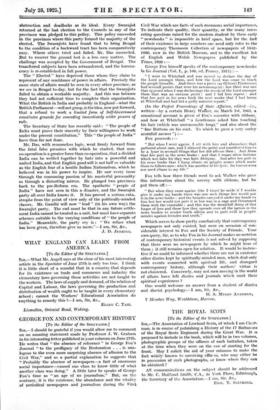GEORGE FOX AND CONTEMPORARY HISTORY
[To the Editor of the SPECTATOR.]
Sin,—I should be grateful if you would allow me to comment on an amazing statement made by Professor J. W. Graham in his interesting letter published in your columns on June 27th. Ile writes that " the absence of reference " in George Fox's Journal " to the profligacy of the Restoration . . . is ana- logous to the even more surprising absence of allusion to the Civil War," and as a partial explanation he suggests that " Probably the absence of newspapers—a fact of enormous social importance—caused one class to know little of what another class was doing." A little later he speaks of George Fox's time as " an age of no journalism." But, on the contrary, it is the existence, the abundance and the vitality of periodical -newspapers and journalism during the First
Civil War which are facts of such enormous social importance. To indicate their quality, their quantity, or the many inter. esting questions raised for the modem student by these early " newsbooks " is impossible in brief space, but for the fact of their existence in large numbers one need only refer to the contemporary Thomason Collection of newspapers of 164E- 1660, now in the British Museum, and to the excellent list of English and Welsh Newspapers published by the Times, 1920 :— George Fox himself speaks of the contemporary newsbooks in his Journal (Vol. I., p. 169, ed. Penney, 1911) :—
" I went to Whitehall and was moved to declare the day of the Lord amongst them, and how the Lord was come to teach the people himselfe. And there was a preist (as O[liverl Flrotectorl had severall preists that were his newsmongers) : but there was one that opposed when I was declareinge the words of the Lord amongst them that was an envious preist : and I bid him repent : and that hee putt in his news book the next weeke that I had been at Whitehall and had bid a godly minister repent."
(In the Perfect Proceedings of Stale Affaircs, edited—i.c., written—by a certain Henry Walker, on March 1st, 1665, a
sensational account is given of Fox's sorceries with ribbons, and how at Whitehall " a Gentleman asked him touching his hair (which was unreasonable long)," and also about the " fine Buttons on his coat. To which he gave a very surley seomfull answer ") :— Fox proceeds :-
" But when I went againe I ett with him and aboundans that gathered about mee, and I silenced the preist and manifested him to be a lyarr in severall things that hee did affirme then : And Alsoe that hee putt in the news booke : and that I woare silver buttons which was false for they was butt Alchymy. And after hee putt in his news booke that I hung ribans on peoples armes which made them to followe mee : which was another of his lyes : for I never wore nor need ribans in my life."
Fox tells how three friends went to ask Walker who gave this information about the sorcery with ribbons, but he put them off :-
" But when they came againe (the 3 time) ho aside if I would° give it under my hande there was noe such thing° hoe would put it in the news booke : and the freindes carryod it under my hande to him but hee would not putt it in but was in a rage and threatened them with the constable : and this was the deceitfull doing of this forger of lyes and these lyes they spreade over all the nation in the news hookas to render truth odious and to putt evil in people, mindes against freindes and truth."
Which serves to show pretty conclusively that contemporary newspapers not only existed, but were on occasion of con- siderable interest to Fox and the Society of Friends. Your own query, Sir, as to why Fox in his Journal makes no mention of contemporary historical events is not solved by supposing that there were no newspapers by which he might hear of them ; it still remains open for solution. It would be instruc- tive if we could be informed whether there are not in existence other diaries kept by spiritually-minded men, which deal only with events connected with spiritual life, and disregard contemporary history, although their authors' virtue is not cloistered. Conversely, may not men moving in the world of affairs have left diaries and journals which omit their spiritual experiences ?
One would welcome an answer from a student of diaries
and diarist psychology.—I am, Sir, &c., H. S. MYERS ANTHONY.
7 Meadow Way, Wealdstone, Harrow.


























































 Previous page
Previous page